




 |
   |
 |
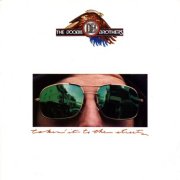 |
Takin' it to the Streets (1973, 38.29) **½/½Wheels of FortuneTakin' it to the Streets 8th Avenue Shuffle Losin' End Rio For Someone Special It Keeps You Runnin' Turn it Loose Carry Me Away |
Current availability:
Mellotron used:
Way back in the early, untutored days of my record-buying career, I picked up a Doobie Brothers album, 1974's What Were Once Vices Are Now Habits. That sleeve! Dry ice! Guitarists! Two drummers! This will ROCK! Of course it didn't, quickly finding its way back to the second-hand shop from whence it came. Two albums later, '76's Takin' it to the Streets introduced the soulful Michael McDonald to the band, the man who ironed out what few creases remained in the Doobies' sound. In fairness, they do occasionally rock out, notably (and briefly) halfway through the title track, while Rio at least has some energy about it, as does the second half of Turn It Loose.
Someone (McDonald?) adds, quite literally, a few seconds of choir to For Someone Special (thanks, Leif), towards the end, under the band's own backing vocals, yet quite distinct. Since I cannot imagine anyone bothering to hire an M400 in specially for the job, we're almost certainly hearing a machine already resident in the studio. While I'm sure I've reviewed albums featuring even less confirmed Mellotron than this, it can't be by much. Don't bother. Really.
 |
Eliza Doolittle (2010, 42.10) **½/T |
|
| Moneybox Roller Blades Go Home Skinny Genes Mr Medicine Missing Back to Front A Smokey Room |
So High Nobody Pack Up Police Car Empty Hand |
|
Current availability:
Mellotron used:
Eliza "Doolittle" Caird (nom de plume taken from George Bernard Shaw's Pygmalion, popularised as My Fair Lady) is a young British singer-songwriter who, going by Google image results, seems to be exceptionally keen on showing off her legs. Sorry if that sounds a bit sniffy, but, y'know, maybe you could try selling yourself solely on your musical talent... Or am I just being hopelessly naïve? Probably. Her eponymous 2010 debut reminds me slightly of Lily Allen, albeit a quirkier, more mature version (although Doolittle's actually younger), its pre-psych '60s-influenced pop shifting between affecting (closer Empty Hand) and irritating (much of the rest), while Pack Up goes back another couple of decades, being based around wartime fave Pack Up Your Troubles In Your Old Kit Bag.
Will Johnstone plays Mellotron, with a string part all over Back To Front, sounding relatively real, although I'm beginning to doubt my ability to spot samples any more. Frankly, you're not going to go for this unless you're a) female and b) young, but I suppose it does what it does well enough (he said, grudgingly).
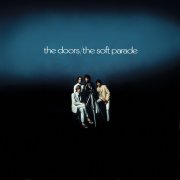 |
The Soft Parade (1969, 33.54/53.46) **½/0 (T) |
|
| Tell All the People Touch Me Shaman's Blues Do it Easy Ride Wild Child Runnin' Blue Wishful Sinful |
The Soft Parade [CD adds: Who Scared You Whiskey, Mystics and Men (version 1) Whiskey, Mystics and Men (version 2) Push Push Touch Me (dialogue) Touch Me (take 3)] |
|
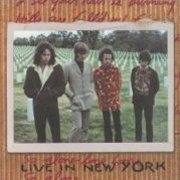 |
The Doors Box Set Disc 1: Without a Safety Net (1997, recorded 1965-70, 67.21) ***½/T |
|
| Five to One Queen of the Highway Hyacinth House My Eyes Have Seen You Who Scared You Black Train Song End of the Night Whiskey, Mystics and Men |
I Will Never Be Untrue Moonlight Drive (Demo) Moonlight Drive (Sunset Sound) Rock is Dead Albinoni's Adagio in G Minor |
|
Current availability:
Chamberlin used:
The Soft Parade has never been The Doors' most fêted album, to say the least; Paul Harris' brass and string arrangements, heavily encouraged by producer Paul A. Rothchild, simply muddy the waters, fatally neutering the band's sound. One particularly scathing contemporaneous reviewer wrote, "The Rothchild Strings Play the Doors", which sums up much of the album. In fairness, it has its better tracks, not least major hit Touch Me (despite those awful brass and string overdubs) and Shaman's Blues, while the lengthy title track has its moments, although it could've done with an edit. Overall, the band clearly weren't ready to record when they did, Ray Manzarek seems to do very little and Morrison phones his contributions in. While there's no tape-replay work to be heard anywhere in the band's original catalogue, Manzarek adds some rather clicky Chamberlin accordions (I don't know which variety) to two of the CD's bonus tracks, both versions of Whiskey, Mystics And Men, for what it's worth, which isn't much. All in all, thoroughly uninspired, I'm afraid.
Back when the three surviving members of The Doors were all speaking to each other (i.e. pre-reformation, The Cult's buffoon-in-chief Ian 'Dan' Astbury replacing Jimbo, haircut and all), they decided to seal their legacy with a four-CD set, imaginatively titled The Doors Box Set (plenty of thought went into that one, then). A fair chunk of it consists of previously-released material, but the first disc, Without a Safety Net, trawls the vaults for stuff that hasn't found its way onto the various archive releases that have appeared over the decades. I've opted to review just the one disc, as a) you probably know most of the rest of it anyway and b) life's too short when this hour-plus is the only relevant part of the set.
I thought the first track, Five To One, recorded in Miami, '69, was going to be the infamous 'did you see it?' performance, but turns out to be merely a Morrison rant at the audience, calling them 'fucking idiots' at one point; fairly strong for the times, I'd have thought. One of the other two live tracks is listed as Black Train Song (better known as Mystery Train) and I can only assume its twelve minutes sounded better at the time than in retrospect, although it morphs into work-in-progress for Roadhouse Blues, by the sound of it. The other is a fairly ordinary take on I Will Never Be Untrue, the remainder consisting of studio outtakes; unsurprisingly, given some of the second-rate stuff that ended up on their official albums, there's nothing here that'll trigger hasty rewrites from the band's various biographers. Saying that, The Doors' outtakes are still better than many band's official albums, so the above rating isn't disproportionate.
So you didn't think The Doors had ever used tape-replay? Nor me, until the release of this set, but there it is on '69's lengthy studio jam Rock Is Dead (still coughing up blood decades later, guys...), with what sounds like solo cello from Ray Manzarek under Morrison's 'rock is dead' rap. Hang on, is this a Chamberlin? There were no Mellotron cellos in 1969 and very few Mellotrons in the States at all at that point. The track itself is quite interminable; it's hardly surprising this hasn't seen the light of day before, although completists will want to hear it. For the second time on this disc, Morrison goes into Mystery Train around the eleven-minute mark, after some choppy something, possibly brass, making this a tape-replay curio, at least.
 |
Dope Feat. Julian Cope (2017, 41.58) ***/TThe Dee Dee Ramone StoryAbsalom & Ahitophel |
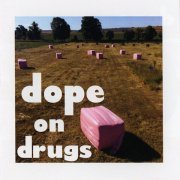 |
Dope on Drugs (2018, 51.34) **½/TFodenLeave Yourself Behind The Binding of Loki |
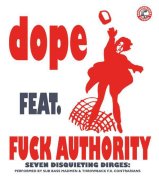 |
Seven Disquieting Dirges [as Dope feat. Fuck Authority] (2018, 41.19) ***½/½Cornish Funeral PathsThe Farmyard A Fiery Flying Roll The Old Barn The Anglo-Saxon Work Ethic The Ranters Christ Burroway at Toller Porcorum |
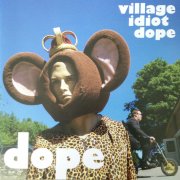 |
Village Idiot Dope (2018, 48.16) ***/TFrenzy on the EarthIt's Been Good for You You Took Me By Surprise |
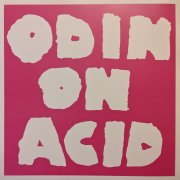 |
Odin on Acid (2019, 32.59) ***/½Psychedelic DeathFeed Your Weed Addiction The Freedom You're Giving Me Ain't Nobody |
Current availability:
Mellotrons used:
The entirely appropriately-named Dope are yet another Julian Cope side-project, loosely tagged as 'space rock', whatever you take that to mean. Their debut, 2017's initially cassette-only Dope Feat. Julian Cope, a.k.a. Environmental Studies (the label on which it's available), depending on which source you believe, consists of two side-long tracks, The Dee Dee Ramone Story and Absalom & Ahitophel. The former is, essentially, a drone piece until around nine minutes in, when the drums suddenly kick off, while the latter is a hypnotic, lysergic trip, trading the band's name for something far more acidic. Cope (presumably) plays quiet Mellotron flute and string parts during the former's early, semi-ambient section, along with what might (or might not) be a mic'd up recording of the motor being sped up and slowed down, plus pitchbent strings in its latter half, with occasional strings on Absalom.
The following year's Dope on Drugs largely follows one of Cope's regular templates, his 'hammer away at the title in a sitting-round-a-psychedelic-campfire' mode, particularly on Leave Yourself Behind, which resembles an early Hawkwind jam, played on acoustic guitar and Vox organ. The near-half hour The Binding Of Loki isn't a lot better, although both of the long tracks start well (Leave Yourself Behind sounds like a prog epic for a brief period), before sinking into a slough of despond. Not much Mellotron, either, with strings on opener Foden, more of the same over the first couple of minutes of Leave Yourself Behind, drifting back in towards the end of the nineteen-minute piece and a handful of string notes near the beginning of The Binding Of Loki. The same year's Seven Disquieting Dirges, credited as Dope feat. Fuck Authority and subtitled Performed By Sub Bass Madmen & Throwback F.X. Contrarians, is heavily drone-based, all low-end monosynth and tribal percussion. It sets out its stall with opener Cornish Funeral Paths, a sparse, eight-minute evocation of the title, although it's possibly at its best on The Anglo-Saxon Work Ethic. You could be forgiven for thinking that Cope's credited Mellotron is a typo, as all I can hear is a handful of heavily-effected pitchbent strings a few minutes into the album's centrepiece, the sixteen-minute The Ranters.
Village Idiot Dope's three lengthy tracks inhabit a space defined by tribal drumming, drones, FX-heavy synths and ominous mutterings; in other words, business as usual. Best track? Probably the more reflective, near-twenty-minute It's Been Good For You. Two Mellotron tracks (kind of), with an occasional flute line and chordal strings on Frenzy On The Earth (ha ha) and a pair of repeating string chords towards the end of You Took Me By Surprise. 2019's Odin on Acid kicks off with a blast of distortion, leading into the raucous Psychedelic Death, keeping up the manic energy across all four tracks. A soupçon of Mellotron (doubled with Vox organ?), with a handful of big, major-key string chords on The Freedom You're Giving Me.
See: Julian Cope
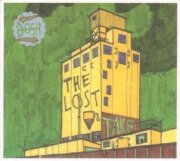 |
The Lost Take (2006, 40.25) **½/TT½ |
|
| One Through Seven Everybody Cheer Up Song Um, Circles and Squares A Ghost's Business Ship Wreck Mpls Rock and Roll Fireball |
Unemployed Blues Pink Floyd Cowboy Blues O Mexico Bottom of a Well The Lost Take |
|
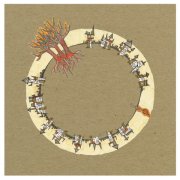 |
Wolves & Wishes (2008, 44.01) **½/TT |
|
| Don't Wait for the Needle to Drop Bury the Ghost If You Want to, You Have to First Impossible Kit and Pearle Wolves Food Cycles Keep Up Appearances |
The Magic Stick Capture the Flag |
|
Current availability:
Mellotrons/Chamberlins used:
Martin Dosh is an instrumental American jazz/electronica artist, for want of a better description, at least going by 2006's The Lost Take. While not a bad album, nor is it a particularly interesting one, at least to non-believers, although at least it features a variety of styles within Dosh's chosen genre mash-up. Dosh plays Mellotron and Chamberlin, with what sounds like Mellotron strings and flutes on opener One Through Seven, with strings of a more Chamberlinic nature, flutes on Um, Circles And Squares and very real-sounding Mellotron flutes on Fireball and the closing title track.
Dosh follows up with 2008's Wolves & Wishes, on which he actually manages to be slightly less interesting than before, sounding more post-rock (aargh!) than anything. Tom Herbers plays Mellotron and Chamberlin this time round, with (Mellotron?) cellos on Bury The Ghost, Kit And Pearle, (Chamberlin?) strings on Food Cycles and both on Capture The Flag. Overall, then, not so interesting, but some passable tape-replay work on both albums, although you'll have to get round the frequently rather dull music.
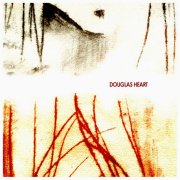 |
Douglas Heart (2003, 34.47) **/T½ |
|
| Smoke Screen A Question of Gender Dream The Telephone Trick Bear Olsson Jim Eveningsong #2 When We Become Strangers |
Lights Dim Song for Douglas |
|
Current availability:
Mellotron used:
Douglas Heart (duo, not person, presumably named for Robert Bruce's unusual deathbed request) play a kind of female-fronted ambient/post-rock, which I've seen described as 'shoegaze', although I was under the impression that was a noisier style altogether. Hey, what these young people listen to, eh? They debuted with 2003's Douglas Heart, a frankly rather dull album, although I'm sure lovers of the genre will swoon over this one, have they not encountered it previously. Nope, no best tracks.
Ramo Spatalovic plays Mellotron, with a brief string part on opener Smoke Screen, more of the same plus cellos on A Question Of Gender, wobbly cellos on The Telephone Trick and a major string part on Lights Dim, nice to hear, but not really enhancing the record that much overall. Does this really sound like your bag? Really? Good luck to you, then. Passable Mellotron, but hardly worth the effort of tracking it down, to be honest.
 |
Dove II (1974, 31.45) **½/TT½Opening/Do You Need SomebodyThe Outlaw Changed Bad News Blues Ugly Louise Freedom Seen it Now Information, Please Adoption |
Current availability:
Mellotron used:
Dove were an early '70s Jesus-rock outfit whose eponymous debut sits firmly in the acoustic camp, making the prog influences on 1974's Dove II all the more surprising. OK, we're not exactly talking Close to the Edge here, although the multi-vocal parts on several tracks, notably Changed and Information, Please, owe more than a little to Yes. Top track? Definitely proggy opener Do You Need Somebody, which packs several sections into three minutes, in perfect 'pocket symphony' style, complete with Wakeman-esque Hammond (they cop his MiniMoog sound on a couple of tracks, too). Of course, the album's lyrical content is utterly puerile, plumbing the depths on Ugly Louise: "Louise was a loser/but Jesus wouldn't refuse her". Ugh.
Bill Landers plays pseudo-orchestral Mellotron strings on Do You Need Somebody, The Outlaw, Freedom and Seen It Now (the strings on Ugly Louise, Information, Please and closer Adoption are real), while Changed gives us an unusual echoed flute motif. This is easily available as a download, should you feel the need; actually, if you ignore the lyrics, several of the songs are perfectly good sub-CSN&Y/Yes-ish efforts, with some decent Mellotron work thrown in for good measure.
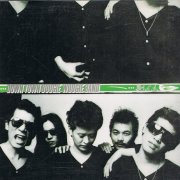 |
Mimokokoromo (1977, 44.15) **½/T |
|
| Tamerai mo Naku Toki wa Sugi Daun Taun Enjeru Shinobi ai Kisu Mī Barādo Main Sutebachi Māchi Kawaitahana |
Muichimon Opera Mimokokoromo |
|
Current availability:
Mellotron used:
The Down Town Boogie-Woogie Band, in true Japanese style, released around twenty albums in eight years (!), 1977's Mimokokoromo being something like their seventh. Also in true Japanese style, it's not only impeccably played, but covers several musical bases, from the energetic Main and the mini-epic, melodramatic closing title track through to the rock'n'roll of opener Tamerai Mo Naku Toki Wa Sugi and slush like Shinobi Ai and Barādo. Something for everyone, then.
Shuichi Chino plays Mellotron, with orchestral-alike strings on Shinobi Ai and choirs (clearly doubling for a real one) on the title track. I can't honestly recommend this, but it's available online should you feel the need.
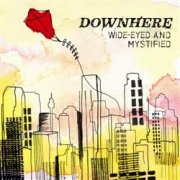 |
Wide-Eyed & Mystified (2006, 54.11) *½/T |
|
| The More Surrender A Better Way Dying to Know You I Will Follow Your Voice Little is Much Stir Forgive Yourself |
Unbelievable The Real Jesus Remember Me 1000 Miles Apart I Miss You Here |
|
Current availability:
Mellotron used:
Downhere play a particularly grisly form of Canadian CCM, all big AOR choruses and the usual delusional single-issue lyrics. Their third album, 2006's Wide-Eyed & Mystified, is filled with the kind of schlock that music lovers should go some way out of their way to avoid; I'm not sure if it has any particular lowlights - it's all horrible.
Zac Rae plays Mellotron (as against Chamberlin, for once), with strings on Dying To Know You, Forgive Yourself, 1000 Miles Apart and I Miss You Here, although the ones on Unbelievable are very obviously real (ironically). All very nasty: run away quickly.
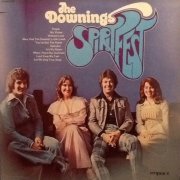 |
Spiritfest (1976, 32.48) */T½ |
|
| People My Vision Without Love Mary Had The Sweetest Little Lamb You've Got The Power Operator It's My Desire Where There Was Darkness |
Lord Keep My Feet Let Me Sing Your Song |
|
Current availability:
Mellotron used:
The Downings were, in many ways, your typical mid-'70s American Christian conglomerate, which is another way of saying that 1976's Spiritfest is a huge, steaming turd of an album, all sickly-sweet, whiter-than-white gospelly vocals, gloopy arrangements and the expected lyrical horrors. Does anything here actually stand out? Kind of. Whichever of the two male members of the ensemble sings lead basso profundo vocals on My Vision could have auditioned as Barry White's stunt double; well, until you get a look at the guy, anyway.
Dony McGuire plays 'Melatron', with orchestral-imposter strings on Without Love, You've Got The Power, It's My Desire and Let Me Sing Your Song, although I can't work out whether the solo flute on It's My Desire is real or Mellotronic. Christ on a bike (he said, appropriately); my regular contributor Mark Medley has a lot to answer for.
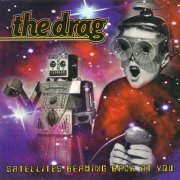 |
Satellites Beaming Back at You (1996, 43.15) ***½/T |
|
| Quiet Feel Eat Your Heart Out Our Race Cars Sterling Comfort Pill Another Shade Die a Little Fountainbleau |
Superstar 8 Why Haven't You Written |
|
Current availability:
Chamberlin used:
Discogs describes South Carolina's The Drag as 'shoegaze/powerpop', which sounds about right on their lone full-lengther, 1996's Satellites Beaming Back at You. Highlights? Opener Quiet Feel, the punchy Eat Your Heart Out, Our Race Cars' 12-string jangle and Die A Little, perhaps, although, despite their potential genre clash, nothing here overly lets the side down.
Mitch Easter is only credited as producer, but, as on several other recordings from the period, he also gets in a little Chamberlin, with upfront cellos on Quiet Feel and a high string line at the end of Sterling. Despite the dreadful sleeve art, this is a surprisingly good album from its era, two Chamby tracks merely improving matters.
See: Mitch Easter
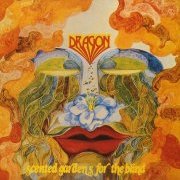 |
Scented Gardens for the Blind (1975, 37.53) ****½/TVermillion CellarsLa Gash Lagoon Sunburst Greylynn Candy Darkness Scented Gardens for the Blind |
Current availability:
Mellotron used:
New Zealand's Dragon prove the old adage about their country: 'twelve hours forward and ten years back'. That may sound a little cruel, but it's a reasonably fair assessment of their original sound and not intended as a criticism. They come across like a turn-of-the-'70s outfit from the UK (OK, so that's only five years), with vestiges of a late-'60s feel to their music, but where they win out is in the strength of their songwriting. Having honed their skills on the notoriously tough NZ 'pub' circuit (huge barns full of drunk Kiwis), it must have been difficult to come up with an album as thoughtful as Scented Gardens for the Blind, but Dragon come through smiling, with a set of memorable yet interesting songs. Organist Ivan Thompson (now there's a Kiwi name for you!) does a grand job on the Hammond, throwing a bit of synth into the mix, plus a smattering of Mellotron on La Gash Lagoon (apparently borrowed from Steve McDonald), but nothing you're not going to hear better elsewhere, to be honest.
Scented Gardens is a damn' good album, even if it's no Mellotron classic. Sadly, the CD has that 'unofficial' look about it, so your money's probably going into some bootlegger's pocket, as with several other acts from that part of the world. Its predecessor, Universal Radio is good, too, but Dragon then slid into commercial mediocrity, becoming one of NZ's biggest (and least-known outside the Antipodes) bands, so avoid anything other than their first two.
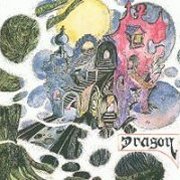 |
Dragon (1976, 38.10) ***½/T½Introduction - InsectsLucifer Leave Me With Tears Gone in the Wind In the Blue Crystal Ball |
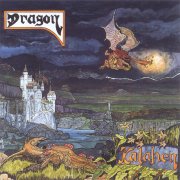 |
Kalahen/Plus (1977/92, 46.47/74.34) **½/TT |
|
| Children Are Playing Game Ballad America Les Hommes Bleus Red Light Kalahen [CD adds: Psychedelic Brotherman |
Blues Ashes Two Drops of Rain Burning Light Fanny (part 1-4) J.V.'s Private Works] |
|
Current availability:
Mellotrons used:
Dragon (Belgian version)'s first album is one of those 'out of time' sort of records, which you'd swear was from a different age, which, oddly enough, it has in common with their New Zealand namesakes. Dragon could quite easily pass for one of those 1970/71 LPs from the likes of Cressida or Spring, with no immediately apparent sign that the band are Belgian. Organ-heavy, with that post-'60s 'jamming' feel about it, the material is actually very good, despite its dated feel. It isn't the most Mellotron-heavy album ever, but Gone In The Wind (OK, I take the Belgian comment back) has some excellent string parts from Christian Duponcheel plus a little choir on Crystal Ball.
Their second album, Kalahen, appears to be no more than a bunch of demos stuck together, although this was in 1977, when such things were almost unheard of (it was issued on CD in 1992 as Kalahen Plus, adding another six tracks). Stylistically, it doesn't seem that the band had moved on much from their debut, with the extra added non-benefit of fairly poor sound quality, including extraneous noise that wouldn't have made the final version. To be honest, the album's a bit of a mess; several tracks are no better than raw jams and, of the original six, the title track's the only one that makes the grade at all and then only because it's so odd.
It's also the only one to feature any Mellotron, although two other tracks have what sounds like string synth. A side-long piece, Kalahen itself opens with Mellotron pipe organ, before great slabs of choir are dropped onto it from a great height; undoubtedly the album's Mellotronic highlight and probably its musical one too, despite its incoherence. There's more choirs on the first bonus track, Psychedelic Brotherman, but that would appear to be it. In fact, apart from that track, the rest of the bonus material actually lowers the quality of the overall release, especially J.V.'s Private Works (guitarist Jean Vanaise), a messy collage of musical snippets, none of which were really worth saving, to be honest.
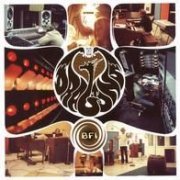 |
BFI (2007, recorded 1970, 41.28) ***/T |
|
| Cosmosis Food for My Soul Amplified Emotion Sandman On the Wall Are You There? Sunset Scenery Mercy Call |
Pop's Bag Big Mike Requiem Your Way Too |
|
Current availability:
Chamberlin used:
The Dragon brothers (their real name), Daryl, Dennis and Doug, were the offspring of serious classical musicians and, by the late '60s, found themselves doing session work in the LA area. They formed their own outfit, The Dragons (fair enough, really), recording in downtime at local studios, calling the sessions the 'Blue Forces Intelligence', although the resultant album was rejected by many record companies as they 'couldn't hear a hit' (usual shit, then). All three went on to success at various levels, all playing with The Beach Boys at one stage. Daryl picked up the nickname 'The Captain' from Mike Love, which he went on to use with the slick, ultra-mainstream duo he formed with his wife, session singer Toni Tennille.
But what of that unreleased album? In 2007, DJ Food (a.k.a. Strictly Kev, apparently) heard a single track on a limited-edition compilation, tracked down Dennis to ask his permission to anthologise it properly, to be told, "There's a whole album of the stuff if you're interested". Before you could say 'Blue Forces Intelligence', BFI appeared, delighting lovers of the funk/soul/psych crossover area, although how well it might have sold if released at the time is impossible to say. Doug played Chamberlin on the sessions, although we're not talking the most major use ever, with that ever-weird solo male voice on opener Cosmosis and Big Mike Requiem, to passable effect.
BFI is well worth the effort for those of you who feel you've exhausted the possibilities of the psych era, although its psychedelic content sometimes takes a back seat to the more danceable end of things. Not much Chamby, but I'm amazed there's anything here at all. Incidentally, did you know that Toni Tennille sang on The Wall? Me neither.
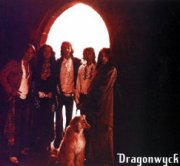 |
Chapter 2 (1995, recorded 1973, 45.50) ***½/TTTT |
|
| Kimberly He Loves You Fire Climbs Relics Freedom Son Lady Run to the Devil |
Dead Man The Music Forever Only Last a Little While [Bonus tracks: Lovin' the Boys The Music] |
|
Current availability:
Mellotron used:
Dragonwyck's debut, eponymous album, leaked out in a minuscule pressing run in 1970, sounding more like The Doors circa '67 than anything else. By the time they'd recorded what ended up as Chapter 2, three years later, they'd progressed to the heady heights of... 1970, making it no particular surprise that, despite a decent fanbase in Cleveland, they were never going to break through commercially. Their second album is actually a pretty decent hard rock/psych effort, just terribly dated, doubtless sounding prehistoric even at the time.
The band had purchased an arsenal of new gear between their two recording sessions, not least a Mellotron (presumably an M400), which keys man John Hall layered all over the album like it was going out of fashion. Strings on most tracks, with flutes here and there (Forever Only Last A Little While is a particular standout), although Hall knew what he was doing with the instrument; there's more than a hint of Mike Pinder's work with the Moody Blues in evidence here, albeit with rather less sonic variety, without a MkII to play with.
All in all, a bit of an unexpected killer Mellotron album, although Hall's work could hardly be described as original, knocking a half 'T' from the album's rating. The official World in Sound reissue (the tapes had been bootlegged before) adds a single from 1974, which, although more up-to-date for the era, is actually less essential than the main album; you'll have trouble buying a copy of this without them, so I'm leaving them in the above tracklisting.
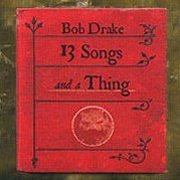 |
13 Songs and a Thing (2003, 50.38) ****/T |
|
| Chase Foam II Abandoned Thermal Establishment Blues Rtuuf Ten for a Dime Move the King In Case the Insulator Fails Griffin - or - an Erotic Dream |
Pechan and Willy Spicules Plinth Shriveller Building With Bones - or - A Thing And the Sun Foam I |
|
Current availability:
Mellotron used:
A founding member of Colorado's Thinking Plague, it seems Bob Drake has now left the band to pursue his own, strange path into the further reaches of RIO (Rock in Opposition). 13 Songs and a Thing seems to cover almost every musical genre known to mankind, plus a few new ones, often all in the same 'song'. It's very odd, but if Drake wanted to do something 'normal', I'm sure he would, so I think we should celebrate the fact that he chooses to go down the road less travelled. Just don't expect an easy listen... Difficult to pick out highlights, when every track differs wildly from every other one, but Chase has a particularly intense section and many others feature Drake's fantastic acoustic guitar work. Oh and if you're not into insane percussion overload, I'd skip the near-thirteen minutes of Building With Bones...
Drake lives in France these days, near the Pyrenees, where he recorded the mighty Nebelnest's latest album, 2002's Nova Express, which is when I suspect he got the band's Olivier Tejedor to add some Mellotron to Ten For A Dime. He puts down some discordant, almost random strings, with the odd bit of 'near-normality', though not enough to give you the impression that Drake's exactly sold out to the mainstream. As a result, you could hardly call this a Mellotron Album, but if you prefer musical backroads, as against the highway (and don't we all, really?), 13 Songs is definitely worth a listen. Oh and don't get him confused with ex-Cardiacs' Bill Drake and no, I've no idea why his website is www.bdrak.com, when www.bdrake.com seems to be available.
See: Thinking Plague
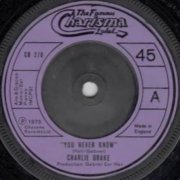 |
7" (1975) **½/T You Never Know I'm Big Enough for Me |
Current availability:
Mellotron used:
For non-Brits (or those too young to know), Charlie "Drake" Springall (1925-2006) was a London-based comedian, at his most popular in the '50s and '60s. As a result, his humour, although apparently not in the especially sexist/racist area, hasn't dated too well, his catchphrase, "Hello, my darlings!" merely sounding quaint today. So why, I hear you cry, are you featuring a superannuated comedian on Planet Mellotron? Why do you think? It seems, by the mid-'70s, Drake wanted to record something more contemporary, so someone must have given him a demo of a song co-written by Peter Gabriel (!), ending up in a studio with Peter and some of his famous friends, not least Robert Fripp and Sandy Denny. The song itself (released on Genesis/Gabriel's label Charisma. Peter's more listenable demo is on YouTube) is a not-untypical, jaunty Gabriel number, in the vein of Willow Farm or Counting Out Time, although Drake's 'comedy' interjections do little to enhance its appeal. Phil Collins, who drummed on the session, gave some background to the affair on his website:
| "It did indeed feature Robert Fripp, Percy Jones, Keith Tippett, me and Peter G. A friend of Pete's, Martin Hall wrote the song, or possibly co-wrote it with Peter, called You Never Know. Apparently Charlie Drake, who was a huge comedy star of the '50s and '60s, wanted to make a record. How he ended up with this line-up I have no idea! It seems the most obscure set of people to make a comedy record. On the day Charlie, who was quite small, turned up with a brand new denim outfit for his rock debut... It was quite touching to see him at it. Percy Jones and I were already in Brand X by then. The whole session was one of life's interesting snapshots!" |
This whole episode is so hard to believe that you'll probably merely shrug at the news that, not only does someone play Mellotron on the track (well, obviously), but that someone is Brian Eno, who adds a brief brass part and chordal choirs to the middle eight, although the repeating descending flute line sounds real. Given the lack of picture sleeve, let alone actual credits, we only know who was involved due to a contemporary promo sheet, apparently. Do you need to hear this? Don't be silly, although Gabriel's demo is worth a listen for Genesis completists. Anyway, let's be thankful it's most unlikely there's any Mellotron on Drake's last single, 1977's Super Punk. Allegedly...
See: Peter Gabriel
 |
What Time Are You? [as Steve Kaczorowski] (1971, 39.46) **/T |
|
| I'd Love to Change the World Think I Better Find My Way Home Sweet Independence [The Painter by Deep Purple] Monkey Demond [Monkey Demon by Orpheus] Big Green Pearl Bryent Hotel [Bryant Hotel by The Left Banke] Morning Window 1926 Love You [We Love You by Web] |
Don't Go What Time Are You? |
|
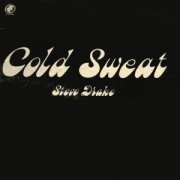 |
Cold Sweat (1975, 43.09) */T |
|
| Maid in Heaven [by Be-Bop Deluxe] Earthworm [No-One's More Important Than the Earth Worm by Stackridge] Sign Your Name [Jean Cocteau by Be-Bop Deluxe] Glimpses of the Future [Declaration of Oneness by Oxpetals] Greenburg, Glicstein, Charles, David Smith and Jones [Greenburg, Glickstein, Charles, David Smith and Jones by The Cryan' Shames] Rainbow Peddler [by Orpheus] Cold Sweat/Don't Cry Mother [Don't Cry Mother by Oxpetals] |
Do You See Now [Down From the Mountain by Oxpetals] Sister Seagull [by Be-Bop Deluxe] Dirty Old Town [by Lucifer's Friend] Happy in the Lord [by Stackridge] |
|
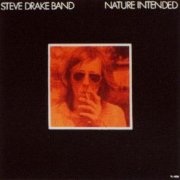 |
Nature Intended [as Steve Drake Band] (1976, 36.04) */T½Nature Intended [by Nutz]Rap on [Lady by Babe Ruth] Slark [by Stackridge] Adam and I [A Fistful of Dollars by Babe Ruth] Somebody [Somebody's Nobody by Babe Ruth] Dave Ross & Me [Gyrosame by Headstone] Eastern Wind [by Headstone] Perfect Love [The Duchess of Orleans by Babe Ruth] Jennie's Extravaganza [Let There Be Lids by Stackridge] |
Current availability:
Mellotrons used:
You think I've reviewed some odd albums? You ain't seen nothin' yet (b-b-b-baby)... Steve "Drake" Kacz/Kaczorowski is probably the most 'successful' (I use the term loosely) total fantasist ever to've done anything in rock'n'roll. Er, hang on... Allow me to explain: Kacz/Drake/whatever was in cahoots with an enormously dodgy NYC label, Tiger Lily, releasing (as far as anyone can work out) three albums, largely consisting of (get this) other artists' songs. So what?, I hear you cry. Everyone plays covers, right? Um... These aren't covers. These are the original recordings, albeit edited, with Kacz' crummy vocals sometimes inserted into the mix; 'Karaoke rock', it's been dubbed by enthusiasts. The whole sorry tale's been detailed elsewhere on the 'Net (try here); suffice to say, his 'technique' was to copy tracks from relatively obscure British import albums (plus a smattering of US artists), perfectly obvious to anyone au fait with the originals, crediting himself as songwriter, often adding completely spurious famous names as session players, not least Don McLean and 'Rob' Fripp.
His initial stab at second-hand fame, 1971's What Time Are You? was released as Steve Kaczorowski and, if you didn't know better, could almost be an album of original material, although it seems, at this early stage, that Kaczorowski was still actually recording (even writing?) the occasional song himself. Of course, more detailed research may prove this to be erroneous. Of the album's ten tracks, only four have been completely proven to be karaoke, notably Sweet Independence, a.k.a Deep Purple's The Painter (from '69's Deep Purple), Blackmore's instantly recognisable guitar work and sound giving the game away. However, as pointed out by online researchers, opener I'd Love To Change The World and Big Green Pearl are genuine Kacz covers, the former a Ten Years After number and the latter by Orpheus, as against his karaoke version of their Monkey Demon, oddly retitled Monkey Demond. Kacz credits himself with Mellotron on Love You, which must come as a bit of a shock to Dave Lawson, as it's another rip, this time from the sole 1970 album by Web, I Spider.
For some reason, it took Kaczorowski four years to repeat the trick, now billing himself as the more rock'n'roll Steve Drake on Cold Sweat, upping the karaoke content to 100%. Kacz/Drake's new favourite artists are clearly Be-Bop Deluxe, Stackridge and the thoroughly obscure Oxpetals, with no fewer than three rips from Be-Bop's latest long-player, Futurama, two from Stackridge's Extravaganza and three from The Oxpetals' sole, eponymous 1970 release, along with material by Orpheus again (Rainbow Peddler), The Cryan' Shames and Lucifer's Friend. One Mellotron track, Stackridge's Andy Davis adding strings to their (No-One's More Important Than The) Earthworm.
1976's Nature Intended seems to be his last 'solo' effort, opening with the 'title track', actually the song of the same name from second-division Brit hard rock act Nutz' second album, Nutz Too, while second song in, Rap On is Babe Ruth's Lady, sounding zero like its predecessor. Stackridge were clearly a Kacz favourite, track three, Slark, being instantly recognisable as the shorter, single re-recording of their first album epic, followed by three more Babe Ruth songs (with female vocals) and a couple by utterly obscure Brit no-hopers Headstone, finishing off with the flip of the Slark 7", Let There Be Lids, retitled Jennie's Extravaganza, presumably as a nod to Stackridge's then-current album. This is quite jaw-dropping, frankly; the bloke was obviously in total denial the whole time, which must get very wearing. He apparently even had fake 'gold records' made to hang on his wall...
The Mellotron? The two tracks present are that single version of Slark, shorter and noticeably different to the album version, with Andy Davis' Mellotron strings and cellos and Alan Shacklock's strings on Perfect Love, a.k.a. Babe Ruth's The Duchess Of Orleans, from the previous year's Babe Ruth. Kacz is also credited as songwriter and producer on No Dice's Cool it Down, which turns out to be an edited version of most of the rest of Nutz Too (which includes the track Cool Me Down), credited to another British band without their knowledge... Absolutely unbelievable, had it not actually happened. Of course, Be-Bop Deluxe confounded Kacz' expectations by breaking through in the States not long after 1975's wholesale rip-off, but he struck lucky with the three (known) bands on this effort, none of whom ever really meant anything on the other side of the pond.
Kacz' albums are all insanely rare, probably because their print runs were so limited in the first place, but then, do you need to hear them? Really? Maybe for their humour value, but if only the 'missing' tracks here could be tracked down (I spotted The Duchess Of Orleans myself, fact fans), you could compile the album from its original sources, should you feel the need, with the added bonus of not having to hear Kaczorowski's limited vocal range. Bizarre. In fact, thoroughly bizarre. Incidentally, the rock-bottom ratings above aren't actually for the music, but the concept, in case you were wondering. I should probably give them less. As a sad postscript to a sad tale, Kacz died in 2009, seemingly convinced to the last that he was, briefly, a 'rock star'. Film rights, anyone?
See: Web | Be-Bop Deluxe | Babe Ruth | Stackridge